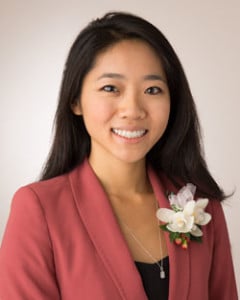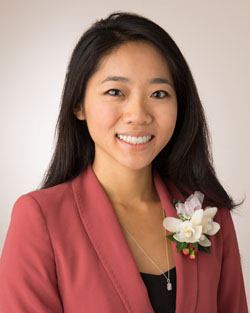
Sarah Wang, an MBA student at the Stanford Graduate School of Business (GSB), was recently awarded a scholarship from the Financial Women of San Francisco (FWSF).
Founded by a group of 17 investment women, FWSF is the first and largest U.S. organization for “females-in-finance.” Since its establishment in 1956, FWSF has granted over $2 million in scholarships. This year FWSF awarded 11 scholarships to a “remarkable group of young women” in finance. The selection criteria included demonstrated leadership skills, academic achievement and communication skills.
The Daily sat down with Sarah, co-president of Stanford Women in Management, the Venture Capital Club and the Epicureans, to discuss her leadership both inside and outside the classroom.
The Stanford Daily (TSD): What first sparked your interest in finance?
Sarah Wang (SW): I think this actually goes back to an internship I had my sophomore year of college. Back then I didn’t really know much about finance at all. All I really wanted was to be in London for the summer, so I applied to a bunch of stuff — all in Europe — to try to get anything I could in London. I ended up working as an investment economics research analyst at a hedge fund based in London. That was my first real exposure to finance.
It was kind of accidental but I absolutely loved that summer. I viewed it as a way to learn about the world and put together the different pieces that fit together in a more interesting way. At least for that fund — it was a global macro fund — you had to connect government to politics, different macro factors like unemployment and things like that, connect them to private industry, and I just thought it was so cool how you could try to piece the world together. Obviously it’s a tough job, so easy to get wrong, but I think that’s the first time I got interested in whatever finance meant at the time.
TSD: Was the internship your “ah-ha” moment or were you always interested in the world of business?
SW: I think that was my “ah-ha” moment, actually! I started Harvard undergrad in 2010. I went in thinking I would be a lawyer and then a Supreme Court Justice or something, so I definitely think [the internship] was pretty pivotal in me thinking, “I actually want to work in business, specifically finance, and within that I want to be an investor.”
TSD: What has your experience been like in the Stanford Graduate School of Business? How has Stanford contributed to your own growth, both as a student and as a person?
SW: I would say that the past year has been really incredible. I came in not really knowing what to expect. I was a little bit scared, frankly, and I had also been working for four years, so I was even a little bit skeptical about what I would be learning. I was pretty blown away, first by the people in my class — they were just incredible — and then by the actual amount of learning that I’ve been doing, whether that’s in class or learning outside of class: talking to alums that have been so generous in their time in helping me figure out what I want to do, but also talking to professors and things like that. I’ve really, really loved it.
It’s given me the opportunity to experiment with different things that I haven’t done before and test hypotheses or theories that I wanted to test going in – both in the summer and during the year. It’s been good and unlike in my previous years of school; I’m actually excited to go back.
TSD: What does it mean to you to be a female in finance? Have you confronted any sexism or prejudices during your journey?
SW: I interned my sophomore year, but my first real job was at Morgan Stanley in New York. I worked on capital market — which is kind of a hybrid between sales, trading and banking. I had been in Undergraduate Women in Business before that and had never really experienced any environment where things had been unequal. I think that’s the first time I realized it actually means something different to be a woman in business.
In terms of role models, you look up, and everyone senior was male, and that dictates the culture — how well you fit in and how much you feel you can be yourself — which for me was not very much. I think everyone was individually very nice, but I came to work feeling very tense and uncomfortable. I think that made me realize that being a woman in finance is broad and harder to define. It means something different to me than just being a person in finance, which I didn’t really realize until I experienced that for the first time.
For me and for so many women, it hasn’t necessarily been anything overt that you can put your finger on. I do think that that Ellen Pao case in the VC [venture capital] world brought to life a lot of things that are very real and tangible but are not quite definable — in terms of feeling like you really belong at work and how you are or aren’t promoted faster. I definitely noticed differences, and I think that what the FWSF is doing, in creating a community of women to support each other, is one of the best and most effective ways to fix that.
TSD: Could you talk a little bit more about FWSF — what the organization and scholarship mean to you?
SW: First of all, I’m so grateful to be able to join this organization. I was really, really proud and grateful to be part of the group of women that won [the scholarship]. We had a big luncheon a few weeks ago, and I got to hear speeches from the other women that won it, and it was so inspiring. I definitely felt like “I really don’t deserve to be here,” but I’m grateful that I am!
I think what’s special about the FWSF is that — on one hand, the scholarship money is amazing — but I think what’s really exciting that they provide is assigning everyone a mentor. I’ve already met with my mentor, Pat Hudson; she’s also a Stanford grad from GSB. She’s just been phenomenal. I’ve never really had a formal mentor like that before. That’s one thing that makes this organization special — they take mentorship really seriously.
I think this is the reason so many people leave [finance]; I left Morgan Stanley a little bit early — you sometimes don’t feel like you have enough support, and maybe it’s easier to just find another job. FWSF creates that support network where you can find informal mentors, formal mentors, but women who are confronting those same kinds of problems and can encourage each other and support each other.
TSD: Where do you see yourself in five to 10 years?
SW: I would answer those differently. In five years, like I mentioned before, I would really love to be an investor. In the summer, I interned in venture capital and really, really liked it. In five years, my dream would be to be a partner at a fund where I get to make influential investments in the areas that I really care about. I think 10 years out or beyond, I would love to start my own fund. One of the things that I’m really passionate about is supporting women entrepreneurs, and so that would definitely be a focus of that fund. That’s where I see myself longer term.
Contact Caroline Harris 15charris ‘at’ castilleja.org.
